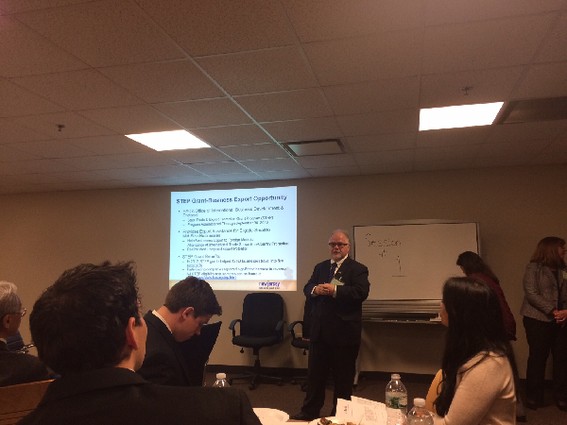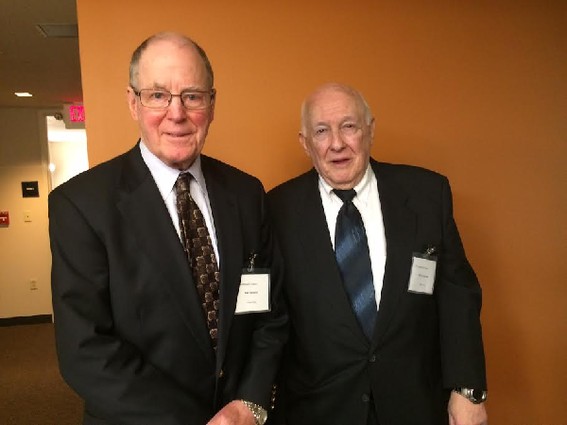NJ EDA Founders and Funders Event Draws 30 Companies and 20 Investors

The New Jersey Economic Development Authority held its third Founders and Funders meeting on March 10. Overall, most companies NJTechWeekly.com spoke with at the event thought that it had been worthwhile, packed with good investor advice. But some expressed concern over the hurried nature of the talks.
The gathering attracted more than 30 emerging companies, who came to the N.J. EDA’s Commercialization Center for Innovative Technologies, in North Brunswick, to participate in 10-minute meetings with 20 potential investors. Companies were pre-matched with individual investors, and they were also coached on their pitches.
Before the meetings between investors and startups began, Kathleen Coviello, director of the NJEDA’s Technology and Life Sciences Division, introduced Melissa Orsen, the new N.J. EDA CEO, who had been on the job for only two days.
Participants also heard about financial vehicles and support mechanisms aimed at the tech sector from Timothy J. Lizura, the N.J. EDA’s president and chief operating officer. Lizura praised the Christie administration, noting that the governor believes in technology as a driver of the state’s economy.
He then gave an overview of the many activities in the state aimed at helping business, and outlined of the goals of the New Jersey Partnership for Action, run by Lt. Gov. Kim Guadagno, including those of its Business Action Center, a one-stop shop for small business.
Lizura added that, Don Newman, director of small business advocacy at the BAC, “knows where every single person in the state resides when it comes to connecting a small business to a resource.” He also talked a bit about Choose New Jersey, now headed by Michele Brown, which is a privately funded, not-for-profit marketing engine for the state.
Pointing out the importance of education to tech companies, Lizura said, “This administration has seen more investment in higher education during my tenure of doing this.” And he noted two key accomplishments in the area of education: the consolidation of Rutgers as a top-flight research institution and the passage by the voters of the Build Our Future Bond Act. The latter resulted in the investment of about $1.3 billion in higher-education, with about 80 percent of that money spent on STEM-related facilities, according to Lizura.
Lizura then turned to the NJEDA’s funding mechanisms and incentive programs for startups, especially the Angel Investor Tax Credit Program. He called the 2013 law establishing the program the most significant piece of legislation he had seen in the last ten years.
The program allows a 10 percent tax credit off the personal income tax for any angel investment in technology up to $500,000. That 10 percent is essentially fully refundable. “If you don’t have any obligations to the State of New Jersey, the state will write you a check for it,” said Lizura. “That’s a ten percent guaranteed return on your capital.” He added that other states may offer 50 percent tax credits, but they’re given to angels only if the companies they invested in make money. In New Jersey, angels get their tax credit right away.
He also praised the Technology Business Tax Certificate Transfer Program (also known as the “Net Operating Loss Program”), which allows unused balance sheet items to be traded in for cash.
[Ed. note: It’s the season to apply for these credits and find out how they work. The NJEDA offers information and a video webinar at the link above. Last year, New Jersey tech companies literally left cash on the table by not applying for this program.]
Lizura and Coviello talked about the state’s investment in venture funds that invest in N.J.’s growing startups. He added that there was a pallet of help for mature tech companies as well.
Speaking next was Coviello who wanted to go into some depth about just what the EDA does. “A lot of what we do is making connections. We spend a lot of time in the market place speaking to entrepreneurs and saying ‘do you know this company also does this?’ Are you talking to this other battery storage company because maybe there’s a partnering opportunity? And we think it’s really important to build community.”
She added, “Just giving away money to a company doesn’t mean success. A lot of it is about connections, mentoring and support, building the community.”

Newman discussed the BAC’s role in cutting red tape (as it did when Amazon.com wanted to build in Robinsville), providing site selection services through the use of real estate software and in negotiating regulatory permitting requirements. “We are willing to talk to you about any problem with state and even non-state entities,” he said.
The BAC assists small businesses in getting mentoring services or resources from SCORE and the Small Business Administration. It can also help companies connect with microlenders, according to Newman. In addition, if “you want to become a vendor to the state, we have some experience and knowledge we can share with you.”
“If you get nothing else out of what I say today, the one thing you should get is the phone number, 866-534-7789.” This is the number of a call center that, he said, is going to be every small company’s door into the state government. He added that the BAC can get companies grants for admission fees to relevant industry conferences, to help them grow their businesses.
NJTechWeekly.com interviewed some of the early-stage companies that came to the Founders and Funders event.

Vikas Khosla, president and CEO of BluePrint Healthcare IT (Cranbury), talked about the patient-engagement platform BluePrint has created, which connects patients and caregivers with their healthcare plan in between visits with providers.
“It provides the support we as patients or caregivers really need to manage chronic illness or acute episodic care.”
Khosla said that the company had been in business for about four years, and had been working on this project for two of them. The company has been bootstrapped, has never had a round of funding, and is looking for help now that it is ready to scale. “We now have four customers and we are looking to expand. We are looking for $2.5 million in Series A financing,” he explained.
Khosla described BluePrint Healthcare IT as a “mature startup with a lot of seasoned professionals on board,” and said that the company already employs some 20 people in New Jersey and also works with an off-shore development team.

Nat Cooperman, president of X-dicator (Freehold), said that he was at the meeting to start his journey towards getting seed funding. “We have developed an indicator that shows whether vaccines have been frozen or not, and also tells whether they have been overheated. We are connecting this to an RFID chip so users in the field can use a smart phone to find out what’s happened to this particular vaccine as it goes along the transportation route.” Cooperman, a chemist and chemical engineer, said that he has five patents on the technology in the United States and four overseas. He added that this is a cost-effective technology that can be attached to a syringe or vile bottle or put inside the vaccine package.
In a follow-up call, Cooperman said that the event had been too hurried for him to really be able to explain his pre-revenue product to the investors. But he added that, in the weeks since Founders and Funders, the company had made great progress on the product and expects to continue to raise money.

Daniel Mordente and Hugh Sinclair, whose company, World Blitz (Union), does business as “Shopping Blitz,” talked about their online retail platform. “We’ve generated over $18 million in three and a half years on the retail side,” said Sinclair. These results proved that the software functions properly, so the company is trying to sell the platform to other retailers. Sinclair and Mordente came to the NJEDA event “to get some contacts and funding to take our business from growth to maturity,” Sinclair explained.. It has already received some bank financing, as well as some help from the SBA.
During a follow-up call, Sinclair told us that Mordente was no longer with the company, but that he (Sinclair) was continuing his efforts to obtain funding for the platform. He added that he did have interest from some investors. “I will be back again, with a little different presentation,” he said. “Learning experience-wise, it was a great event,” he told NJTechWeekly.com, and “we did get some great advice.”
The next Founders and Funders event is tentatively scheduled for October 2015.

